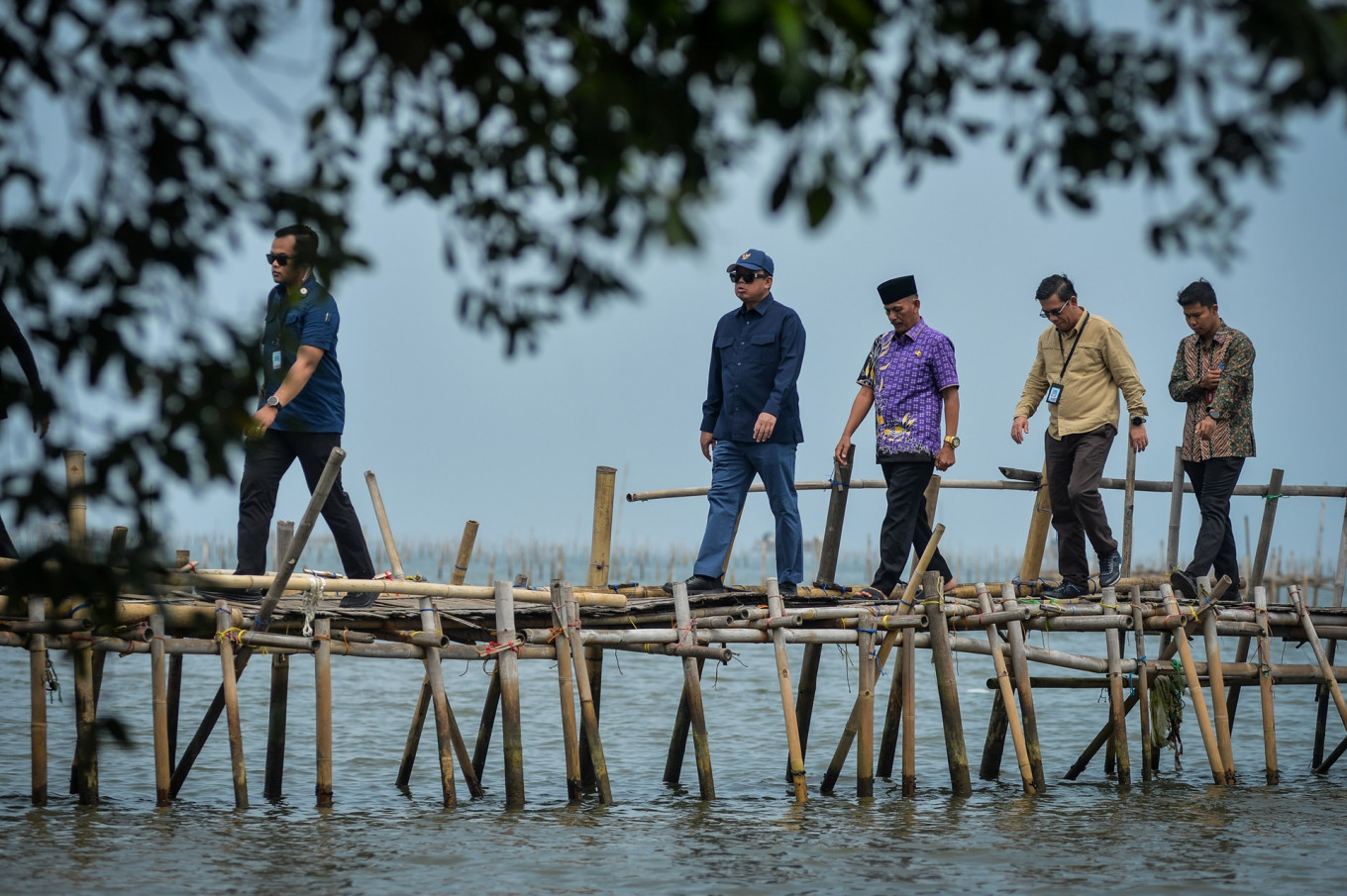Popular Reads
Top Results
Can't find what you're looking for?
View all search resultsPopular Reads
Top Results
Can't find what you're looking for?
View all search resultsAnticorruption barrier
There is a growing perception that the current administration is merely replacing old power brokers with new ones, without enacting substantive reforms.
Change text size
Gift Premium Articles
to Anyone
 Agrarian and Spatial Planning Minister Nusron Wahid (second left) walks along a bamboo bridge on Jan. 24 while inspecting the 30-kilometer sea fence in Kohod village, Tangerang regency, Banten. The ministry revoked more than 250 land use and ownership permits along the sea fence, which was allegedly built by private contractors to lay the groundwork for a land reclamation project. (Antara/Putra M. Akbar)
Agrarian and Spatial Planning Minister Nusron Wahid (second left) walks along a bamboo bridge on Jan. 24 while inspecting the 30-kilometer sea fence in Kohod village, Tangerang regency, Banten. The ministry revoked more than 250 land use and ownership permits along the sea fence, which was allegedly built by private contractors to lay the groundwork for a land reclamation project. (Antara/Putra M. Akbar)
T
he recent revelation of a 30-kilometer bamboo sea barrier off the coast of Tangerang, Banten, has cast a long shadow over President Prabowo Subianto’s proclaimed anticorruption agenda.
This unauthorized structure, erected by proxy to a prominent property developer, not only obstructs traditional fishing routes, but also unveils a web of illicit land certifications and environmental neglect.
The arrest of the Kohod village chief for allegedly forging documents to facilitate the issuance of land titles for 280 sea plots is a commendable step toward accountability. However, this action barely scratches the surface of a more extensive network of complicity involving both public officials and private entities.
The focus on a local official, while higher echelons remain unscathed, raises concerns about the government’s commitment to justice.
Environmental regulations appear to have been blatantly disregarded in this high-profile episode. The encroachment into marine areas has disrupted local ecosystems and jeopardized the livelihoods of coastal communities dependent on these waters. The government’s tepid response to these environmental violations suggests a troubling indifference to ecological stewardship and community welfare.
Moreover, the involvement of influential figures, such as Gerindra Party lawmaker Siti “Titiek” Hediati Herijadi, a daughter of the New Order founder Soeharto and former wife of Prabowo, in the fence’s dismantling adds a layer of political theater to the saga.
While her participation garners public attention, it does little to address the systemic issues at play. There is a growing perception that the current administration is merely replacing old power brokers with new ones, without enacting substantive reforms.
The implications of this scandal extend beyond the immediate environmental and legal breaches. They cast a pall over upcoming infrastructure projects, notably the proposed Giant Sea Wall. Listed as one of 77 national strategic projects to be realized in 2025-2029, the giant wall is aimed at protecting Jakarta from rising sea levels.
If the government cannot enforce compliance and integrity in smaller ventures, how can the public trust its oversight of large-scale initiatives?
Ensuring that such projects adhere strictly to environmental standards and ethical governance is imperative to prevent repeating past mistakes.
The human cost of this debacle is profound. Fisherfolks have lost access to traditional fishing grounds, threatening their livelihoods and cultural heritage. Allegations of identity card theft and document forgery have surfaced, with local residents’ names misused to legitimize the illegal land claims, which is in itself a bizarre violation under prevailing law.
This breach of trust underscores the urgent need for robust legal protections for vulnerable communities.
To restore public confidence, the authorities must conduct an exhaustive investigation, sparing no one, regardless of their position or connections.
This includes scrutinizing regional leaders like the Banten governor and the Tangerang mayor, as well as high-ranking officials in the ministries overseeing economic affairs, land and zoning and finance. Even the Financial Transaction Reports and Analysis Center (PPATK) and the National Police headquarters should be examined for potential lapses or collusion.
President Prabowo’s administration faces a litmus test. The sea fence scandal is an opportunity to demonstrate a genuine commitment to eradicating corruption and upholding the rule of law.
Failure to do so risks perpetuating a cycle of impunity and undermines the nation’s development goals. Keen observers, including potential investors, are watching to see whether Indonesia can seize this opportunity to chart a renewed course toward transparency and accountability.
The sea barrier scandal is more than an isolated incident; it is a proving ground for the government’s resolve to tackle entrenched corruption and environmental degradation.
The administration must act decisively to dismantle the networks that enabled this fiasco and implement safeguards to prevent future occurrences.
The government can only hope to build a sustainable and equitable future for all its citizens if it stays committed to justice and accountability.










